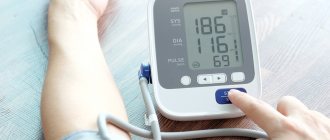Glucophage Long, 750 mg, extended-release tablets, 30 pcs.
Lactic acidosis
Lactic acidosis is a rare but serious (high mortality unless promptly treated) complication that may occur due to accumulation of metformin. Cases of lactic acidosis when taking metformin occurred mainly in diabetic patients with severe renal failure.
Other associated risk factors should be taken into account, such as decompensated diabetes mellitus, ketosis, prolonged fasting, alcoholism, liver failure and any condition associated with severe hypoxia. This may help reduce the incidence of lactic acidosis.
The risk of developing lactic acidosis should be taken into account when nonspecific signs appear, such as muscle cramps accompanied by dyspeptic disorders, abdominal pain and severe asthenia.
Lactic acidosis is characterized by severe malaise with general weakness, acidotic shortness of breath and vomiting, abdominal pain, muscle cramps and hypothermia followed by coma. Diagnostic laboratory parameters are a decrease in blood pH (less than 7.25), plasma lactate concentration over 5 mmol/l, increased anion gap and lactate/pyruvate ratio. If lactic acidosis is suspected, stop taking the drug and consult a doctor immediately.
Surgical operations
The use of metformin should be discontinued 48 hours before elective surgery and can be continued no earlier than 48 hours after, provided that renal function has been found to be normal during the examination.
Kidney function
Since metformin is excreted by the kidneys, before starting treatment and regularly thereafter, it is necessary to determine the content and/or Cl of creatinine in the serum: at least once a year in patients with normal renal function and 2-4 times a year in elderly patients, as well as in patients with Cl creatinine at the lower limit of normal.
In case of creatinine clearance less than 45 ml/min, the use of the drug is contraindicated.
Particular caution should be exercised in case of possible impairment of renal function in elderly patients, with simultaneous use of antihypertensive drugs, diuretics or NSAIDs.
Heart failure
Patients with heart failure have a higher risk of developing hypoxia and renal failure. Patients with CHF should regularly monitor cardiac and renal function while taking metformin. Taking metformin in acute heart failure and CHF with unstable hemodynamic parameters is contraindicated.
Other Precautions
Patients are advised to continue to follow a diet with even carbohydrate intake throughout the day. Overweight patients are recommended to continue to follow a hypocaloric diet (but not less than 1000 kcal/day). Patients should also exercise regularly.
Patients should inform their physician about any treatment they are undergoing and any infectious diseases such as colds, respiratory tract infections, or urinary tract infections.
It is recommended that routine laboratory tests be performed regularly to monitor diabetes mellitus.
Metformin does not cause hypoglycemia when used alone, but caution is recommended when used in combination with insulin or other oral hypoglycemic agents (for example, sulfonylureas or repaglinide, etc.). Symptoms of hypoglycemia include weakness, headache, dizziness, increased sweating, rapid heartbeat, blurred vision, or difficulty concentrating. It is necessary to warn the patient that the inactive components of the drug Glucophage® Long can be excreted unchanged through the intestines, which does not affect the therapeutic activity of the drug.
Impact on the ability to drive vehicles and machinery.
Monotherapy with Glucophage® Long does not cause hypoglycemia and therefore does not affect the ability to drive vehicles and operate machinery.
However, it is possible to develop hypoglycemia when using metformin in combination with other hypoglycemic drugs (sulfonylurea derivatives, insulin, repaglinide, etc.). If symptoms of hypoglycemia appear, you should not drive vehicles or machinery.
What is this drug and what is it for?
The “audience” of Glucophage is people suffering from diabetes. They need to lower the level of insulin in the blood. The drug is linked to weight loss by this hormone: its function is to accumulate fat. Accordingly, the less insulin, the less fat deposits, and the closer we are to our cherished goal.
Description
Glucophage really has a lot of advantages: it utilizes glucose in the muscles, reduces appetite, lowers the level of bad cholesterol, prevents diseases of the cardiovascular system, and helps to use fat as energy. And all this, of course, could not pass by those losing weight, who are trying with all their might to minimize their efforts in this difficult matter.
Conditions of release/sale
The drug is released strictly according to prescription. If a pharmacist calmly sells Glucophage without this document, you should think about how reliable the pharmacy is.
Is it possible to take glucophage as a means of losing weight?
How justified is the use of Glucophage in order to become slim in the absence of diabetes is a controversial issue. No research has yet been conducted to support this statement. The main proof of its effectiveness in the process of losing weight is only positive reviews from those who completed the course.
I am very skeptical about this kind of weight loss methods, so, in order to be objective, I turned to two doctors I know: a therapist and an endocrinologist. According to both, it is unlikely that there will be a specialist who will prescribe this medicine for no apparent reason, that is, the direct need for pills.
You've probably heard a couple of stories about how, after a miraculous, very quick transformation from chubby to skinny in an unconventional way, women became victims of terrible consequences. Well, okay, think for yourself, decide for yourself whether to lose weight or not to lose weight in this way. I'll continue for now.
How not to buy a fake
This, of course, applies not only to Glucophage - it is important to buy all drugs only in a pharmacy, and they must be tested and have the appropriate license. Pay attention to the cost: the approximate price of the product in Moscow is from 100 to 500 rubles.
What should the packaging be like?
The blisters are placed in a white cardboard box with the symbol “M”. The dose is written on the package, followed by the name of the drug, and below it is the inscription “Metformin”. The number of tablets in the pack is also indicated. The manufacturer's logo is located in the lower right corner.
Fake and original: what's the difference?
Unfortunately, counterfeits are now a common occurrence in pharmacies. Over the past 5 years, entire batches of Glucophage have been confiscated from pharmacies more than once. The difference between a fake and an original is that the former simply does not help, and if those who try to use this product for weight loss simply do not see the result, then the pacifier can lead to unpleasant consequences for diabetics.
By the way, just recently I came across information about how one resident of Germany purchased a pack of Glucophage in Russia. Within a few days, his condition worsened significantly, something that never happened while he was taking the French-made drug in his home country. Suspecting that it was all about the product, he took the package home and submitted it for examination. From the expert’s conclusion it followed that the diabetic had been on harmless vitamins for several days, which had nothing to do with sugar-lowering drugs.
Feedback from hosts
Aliya (28 years old):
“During pregnancy and after giving birth, my weight went up a lot. I tried teas, diets and various drugs, including Glucophage. Everything helped at least a little, but not for long. With glucophage I lost a little in 2 months - about 7 kg, however, the stretch marks smoothed out, the skin tightened and the condition of the hair improved. But, you know, after analyzing what I did during these months, I realized that it was probably not the drug.
I never returned to strict diets, but I adjusted my diet a little – I almost completely eliminated sweets, flour and fatty foods, I started drinking a lot of water and walking more. Even now I cook to music that makes it impossible not to move. I stopped drinking Glucophage, but I’m not gaining weight, so I think that if it helped, it was only at the very beginning, in starting the process.”
Maria (35 years old):
“I fell for fashion. I took Glucophage, drank it for two weeks, all this time my stomach hurt, the feeling of nausea persisted, I had loose stools. Everything stopped as soon as I stopped poisoning the body.”
Rita (41 years old):
“I drink Glucophage as prescribed by the endocrinologist. Due to diabetes, I gained a lot of weight, but the drug helped a lot, I lost an average of 3 kg per month, in 4 months the weight was adjusted and reached the desired level, and now it’s holding. In my case, the medicine helped a lot, although I’m not sure whether it works the same way in the body of a healthy person.”
Before and after results
Photos of people with diabetes who took Glucophage:
What doctors and studies say
The vast majority of doctors categorically do not approve of taking Glucophage as a fat burner. Endocrinologists and nutritionists warn that this is a serious drug that copes well with its direct responsibilities, but is not suitable as a “lazy” means for losing weight. And they remind you that they have not yet come up with a better way to fight extra pounds than physical activity and dietary nutrition (this does not mean a hunger strike).
Side effects
While taking the drug "Glucophage Long 1000" according to the instructions, negative reactions may occur:
- On the part of the nervous system, a symptom such as a metallic taste in the mouth appears.
- On the part of the hepatobiliary system, the occurrence of hepatitis or disturbances in liver function cannot be ruled out (when metformin is discontinued, adverse effects completely disappear).
- From the digestive system, symptoms such as vomiting, nausea, abdominal pain, diarrhea, lack of appetite occur (these effects appear at the beginning of treatment and subsequently disappear; if you take Glucophage Long with food, and also gradually increase the dosage, then the likelihood of these adverse reactions will decrease).
- Metabolism may also be affected. The occurrence of lactic acidosis cannot be ruled out; if therapy is long-term, the absorption of vitamin B12 decreases (with megaloblastic anemia this should be taken into account).
- Symptoms such as itching, erythema, and urticaria appear on the skin.
If any unpleasant symptom occurs, you should consult a doctor.
If kidney and liver function is impaired
When creatinine clearance is less than 60 ml/min, when there are acute conditions that occur with a risk of renal dysfunction (dehydration with severe/chronic diarrhea, repeated bouts of vomiting), severe infectious diseases, shock, the drug “Glucophage Long” 1000 mg is contraindicated ; when renal failure is observed (with a creatinine clearance of 45–59 ml/min), therapy is carried out with caution.
According to the instructions for use, the medication is not prescribed for liver disorders.
Interaction of the drug with other drugs
During a radiological examination, when iodine-containing radiocontrast agents are used, lactic acidosis may develop in diabetics with renal failure.
If you take ethanol at the same time, it is possible that lactic acidosis may occur during acute alcohol intoxication, especially if there is liver failure, and while following a diet with a small amount of calories.
It is not recommended to use medications containing ethanol during therapy.
The medication should be combined with caution with diuretics, danazol, beta2-adrenergic agonists, chlorpromazine (in doses of 100 mg per day), drugs that have an indirect hyperglycemic effect (in particular, glucocorticosteroids and tetracosactide for local/systemic use.
Pharmacokinetics
Glucophage reduces elevated blood sugar without causing hypoglycemia. In this case, insulin is not produced, and hypoglycemia does not develop in a healthy person. Glucose that enters the body is utilized by its cells, and its absorption into the digestive tract is inhibited. Under the influence of the drug Glucophage, the liver reduces glucose production and stimulates glycogen synthesis.
At the same time, the metabolism of dietary fats is normalized, and total cholesterol, LDL, and TG levels decrease. This feature of the pharmacokinetics of the drug makes it possible to maintain normal weight or gently reduce it.
Glucophage is completely absorbed from the digestive tract. This process may be delayed depending on food intake. The drug is distributed in tissues and excreted by the kidneys.
Release form
Glucophage is available in packs of 30, 50, 60 and 100 tablets.
Long
Glucophage Long is a white capsule-shaped tablet with “500” or “750” engraved on one side.
Glucophage 500, 850, 1000
500 and 850 mg: white, round, biconvex with a film shell.
1000 mg: white, oval, biconvex with a film shell. "1000" is engraved on one side.
Overdose
There are known cases of exceeding the dosage of Glucophage by 40 times or more. However, no sharp decrease in blood sugar levels was observed in these people. However, lactic acidosis developed if patients were not provided with timely medical care. An overdose requires hospital treatment. Moreover, the person must be hospitalized as an emergency. To quickly remove the drug from the body, dialysis will be required; the rest of the treatment depends on the symptoms that occur in the victim






